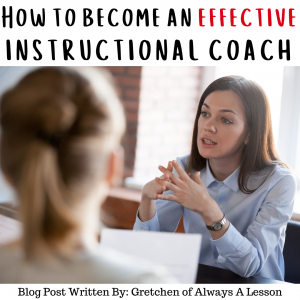How to Become an Effective Instructional Coach
 Becoming an effective instructional coach is not as daunting of a task as one might think. It is true that instructional coaching is one of the newer additions into the educational realm of teacher leadership. Luckily though, each year more supports are created to help nurture the growth of instructional coaches.
Becoming an effective instructional coach is not as daunting of a task as one might think. It is true that instructional coaching is one of the newer additions into the educational realm of teacher leadership. Luckily though, each year more supports are created to help nurture the growth of instructional coaches.
What is an Instructional Coach?
They are experienced teachers who lead classroom teachers towards effectiveness. This often means instructional coaches no longer have their own classroom of students. Instead, teachers become their students as they push into their classrooms to provide feedback and guidance on their instruction.
Instructional coaching is a powerful tool for a personalized approach to professional development. It is often 1:1 with tips and strategies shared applicable to a teacher’s unique characteristics- teaching style, student combination, subject area expertise, etc.
How does an Instructional Coach Better their own Performance?
If instructional coaches are spending all of their time helping other educators improve, how are they themselves improving? After all, coaches need coaches too!
Sadly, a coach for a coach isn’t always readily available. So what is a coach to do? They can increase their effectiveness in a variety of ways:
-
- Attend conferences
- Read scholarly articles and books
- Connect with other coaches in a Mastermind group
- Receive feedback from teachers
- Receive feedback from an administrative leader
Sometimes though, those growth opportunities are few and far between. So during the interim period, an instructional coach can take learning into their own hands. Just like an educator utilizes a teaching performance rubric to 1) measure their effectiveness in the classroom and 2) plan to implement specific actions to reach new level goals, coaches can too!
What Aspects of Instructional Coaching are Essential to Focus on?
Having a coaching performance rubric to 1) measure success in their work with teachers while also 2) having a common language to set goals for increasing their own proficiency in their role is essential to long-term growth.
The work of an instructional coach can vary campus to campus. However, there are common characteristics of an effective instructional coach that should be considered. For example:
-
- Availability- being easy to locate with an open calendar dates to coach
- Communication- using an effective style with a clear message
- Debrief Conversation- implementing a thorough, clear process
- Feedback – providing accurate and aligned guidance
- Observations – watching teachers on a consistent basis with a specific lens of focus
- Professional Development- taking advantage of ongoing learning opportunities
- Professionalism- following the school/district code of conduct
If an all encompassing coaching performance rubric is too daunting to implement at first, coaches can start smaller. By honing in on one specific area of improvement, instructional coaches can experience success faster. Using a mini performance rubric (like this one) can help move the performance needle.
-
- Want to snag both the teacher and coach performance rubrics at a discount? Grab them here.
Overall, instructional coaches should take the same initiative that those they serve do in improving their own performance. It requires intention through goal setting and ongoing measurement. It is not a task to complete, rather an career long process of getting clear on what actions are more effective in guiding teachers towards success in the classroom. Once those actions are outlined, instructional coaches can set goals and measure their achievement. The rubrics mentioned above help hold instructional coaches accountable for becoming more effective in their role.
(If you are loving this post and want more, check out the instructional coaching series and the coach focus series blog posts her on the website!)
What is your strategy for becoming an effective instructional coach?

